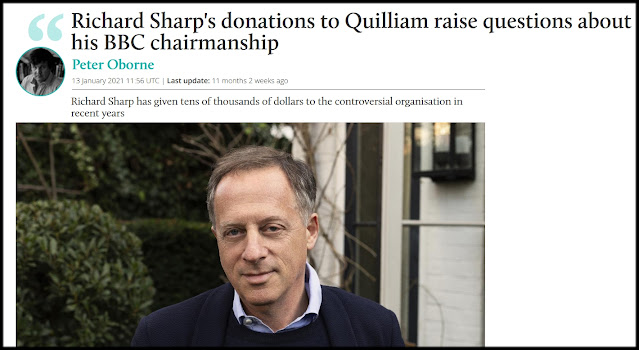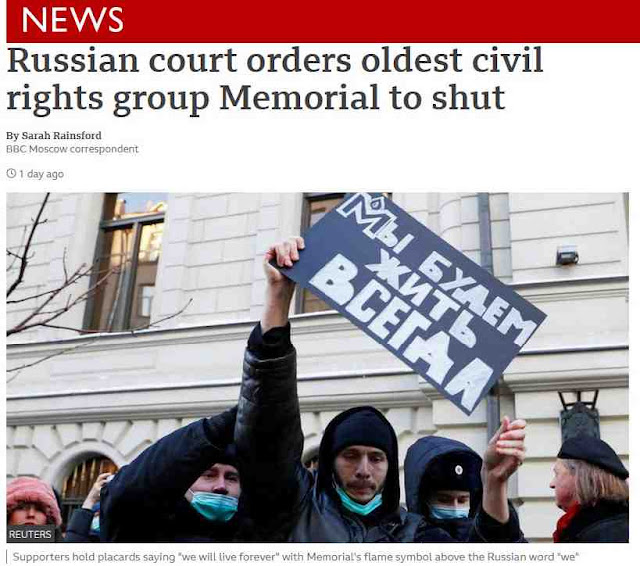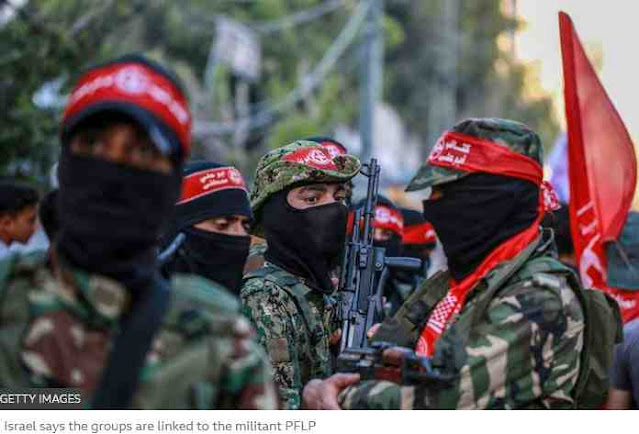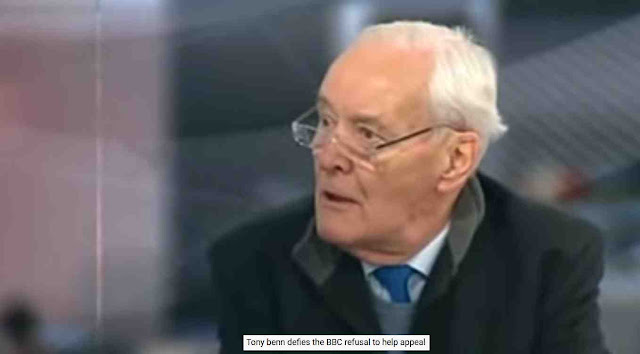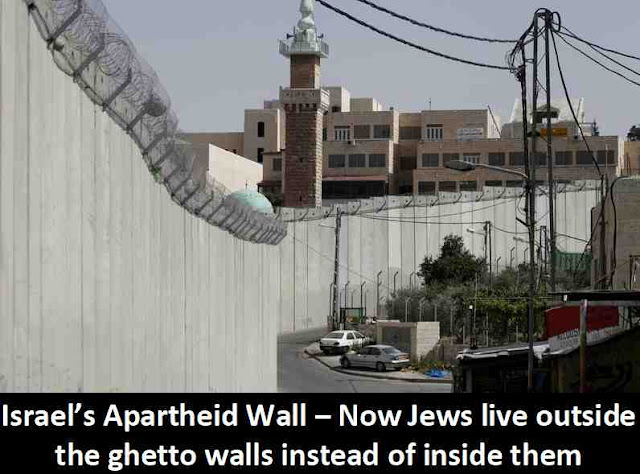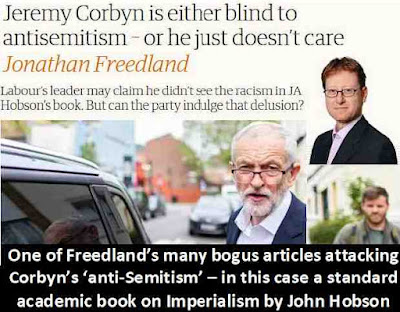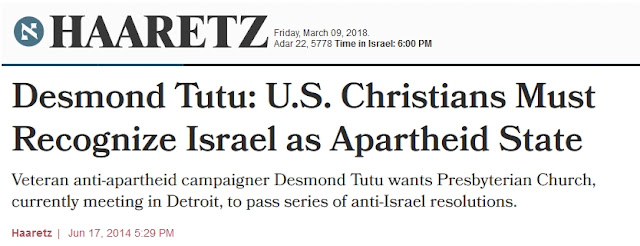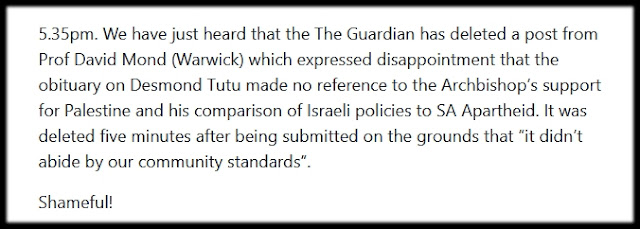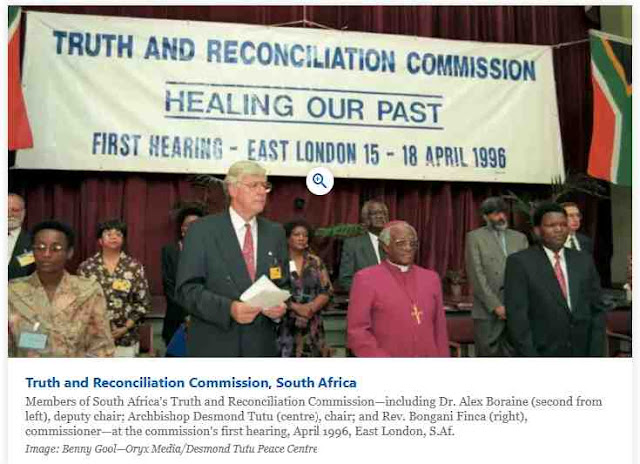The Contrast Between the BBC’s Treatment of Russia’s Banning of Memorial Whilst Ignoring Israel’s Banning of Six Palestinian Human Rights Groups is Striking
I was
watching the midnight
edition of BBC News 24. The top story was Russia’s banning of human rights
group, Memorial. Fiona Bruce and the
BBC’s Russia correspondent Steve Rosenberg didn’t even bother to give Russia’s
reasons for the ban. It was taken as given that this was an egregious and
indefensible act.
Bruce told
us that it had come ‘at the end of a year
when the Kremlin has cracked down vigorously on its critics.’ Rosenberg
told us that
‘more and more it feels as if Russia is turning the
clock back. ‘Liquidate’ the judge
says.... The organisation was found to have broken Russia’s draconian foreign
agents law. ‘Disgraceful decision’
was the reaction from the gallery.’
Grigory
Yavlinky of the Yabloko Party was then interviewed who stated that it’s just ‘one more step from an authoritarian,
totalitarian regime’ with an extended description of how Memorial was shining a light on ‘one of the darkest chapters of Russian
history’ namely Stalin’s terror.’
Rosenberg
told us that the founding of Memorial
30 years ago was a ‘symbol of the Soviet
Union opening up, facing up to its past’. But the ‘shutting down of Memorial is a symbol also of how the past is being
reshaped, rewritten and how civil society is under attack.’
https://www.youtube.com/watch?v=kWwCX0AjjNI
BBC 24 Hours makes the banning of Memorial a Russian Human Rights Group the lead news item
We were
then shown a picture of Putin and the military, as a backdrop to the decision
and we were told that Putin has been ‘using
history to try to foster patriotism’.
Of course this is not something that would happen in the West! Clearly the competition between Boris Johnson
and Keir Starmer as to who can fit most Union Jacks into one photo shot is
about something entirely different.
The BBC’s
concern with human rights, be it in Russia, China or Hong Kong is selective and
runs in tandem with British and Western Foreign Policy. When do we have similar
reports on America’s client regimes such as Colombia or US support for coups
against popular regimes that threaten its interests? When was the last BBC
documentary on Saudi Arabia’s bombing of Yemen’s civilians or the threat that Israel
poses to its neighbours?
In October
Israel banned
not 1 but 6 Palestinian human rights groups. One of them, Al Haq, was founded in 1979, some 43 years ago. Nearly half as long
again as Memorial. Did the BBC give us an insight into its work
and film its staff at work? B’Tselem,
the main Israeli human rights group described
Israel’s banning as ‘an
act characteristic of totalitarian regimes’. Did the BBC interview anyone
who described Israel’s actions in these terms? Of course not.
Memorial was banned by order of Russia’s Supreme Court, which is
about as independent of government as our own Court of Appeal when it decided
to hand over Julian Assange to the tender mercies of America’s judicial and
prison system. Yet Israel didn’t even bother with the fig leaf of an order from
Israel’s Colonial Courts. It was banned by edict from Israel’s War Minister Benny Gantz. On this the BBC also had no comment
What limited coverage the BBC gave to Israel's banning of 6 human rights groups gave prominence to the accusations of 'terrorism' not the attack on the freedom of Palestinians
Who
were the groups which Israel described as a front for the Marxist Popular
Front for the Liberation of Palestine?
1.
Al-Haq, Law in the Service of Man,
2.
Addameer Prisoner Support and Human Rights Association, Bisan
3.
Center for Research and Development,
4.
Defence for Children International-Palestine (DCI-Palestine),
5.
the Union of Agricultural Work Committees (UAWC) and
6.
the Union of Palestinian Women’s Committees (UPWC).
Anyone
who has any acquaintance with the work of these organisations knows that
Israel’s motives in banning the groups was political and related to their
opposition to the Occupation. The allegations were made without a shred of
evidence.
The BBC included a picture of
PFLP guerillas as part of its McCarthyist guilt-by-association techniques - not
once did it ask where the proof was that PFLP military operations were funded
by groups like Defence of Children International-Palestine
The
idea that these organisations cannot employ members or supporters of the PFLP
is preposterous. The PFLP is a legitimate Palestinian organisation. Settler
groups that regularly terrorise Palestinian farmers are described
by Israeli Interior Minister Ayelet Shaked as the ‘salt of the earth’ but Palestinian civil society groups or indeed
any group opposing Israel’s occupation are ‘terrorist’.
The
background to the BBC’s bias, in which every Israeli attack on the Palestinians
is ‘retaliation’ whereas Palestinian attacks on settlers or the military is
‘terrorist’ is laid out in Tim Llewellyn’s excellent talk which the Balfour
Project hosted in
August.
Tim
Llewellyn, a former BBC Middle East reporter, described how the BBC has adopted
the viewpoint of the British and American Establishment on Israel and how it
systematically distorts its news output in favour of Israel. Of course if the
Palestinians lived in Hong Kong or Tibet then the BBC would be all over them
like a rash.
We can get some measure of the BBC’s attitude by its response to Tim’s
article in the Guardian where it says that:
Although
Tim Llewellyn was indeed a BBC correspondent some years ago, we note that he
subsequently was active for a period with the Council for Arab-British
Understanding (CAABU).
Having nothing to say to rebut the substance of Tim’s article the BBC resorted
to attacking him personally because he is a member of CAABU, an organisation
devoted to fostering British-Arab understanding.
But when Danny Cohen, a former
BBC Director of Television signed a letter
in the Guardian opposing a cultural boycott of Israel, the BBC merely said
it was ‘inadvisable’. There was no
condemnation.
The BBC was born in the womb of the
British state. It has a record of racism, support for colonialism and hostility
to the working class and trade unions. I expect no different from it which is people
should not pay the TV Licence fee. There
is no reason why ordinary people should pay to fund this anti-working class
organisation.
The BBC’s present Chairman Richard
Sharpe, has donated £400,000 to the Tory Party over the last 20 years. As
Richard Oborne detailed
Sharpe donated a further £35,000 to the Islamaphobic charity Quillam, which itself was funded by some
of the most virulent ‘counter Jihad’ organisations
such as the John Templeton Foundation.
I disagree with Tim’s suggestion in
the Guardian article that the responsibility for complaints should be taken out
of the hands of the BBC Trust (which has been abolished) and handed to Ofcom,
the state regulator. Why? Because this
has already been done and we saw how effective Ofcom was when it refused
to investigate last year’s BBC Propaganda Film by John Ware, Is Labour Anti-Semitic?
I
include below two previous articles that Tim Llewellyn wrote for the Guardian
in 2009 and 2011 before Jonathan Freedland seized control of the Comment
columns and before the Guardian’s dire editor, Freedland Kath Viner, gave the MI5
a veto over what the Guardian is allowed to print on Britain’s security state.
Below
is Tony Benn’s interview
on BBC Today programme where he defied the edict of BBC Director General Mark
Thompson, who had banned an Appeal by the Disaster Emergency Committee. In 2008
Israel launched Operation
Cast Lead in the course of which it killed 1400 people, 85% of whom were
civilians, including 288 children.
Tony
Greenstein
BBC
is 'confusing cause and effect' in its Israeli coverage
A
controversial book concludes Corporation still fails to present a fair and
balanced picture of conflict
Israeli
soldiers attack Palestinians during a demonstration marking al-Nakba Day in
Bethlehem Photograph: Rex Features
Mon 23 May 2011 07.00 BST
British broadcasters' coverage of the Arab awakening over
recent months has been brave and honest. These are difficult and dangerous
stories. But the BBC – and
in this article I am going to concentrate on the BBC, because it is the
broadcaster we are taxed to enable and sets worldwide standards of fairness –
and its teams have made every effort to report with balance and application.
However, the BBC coverage of Israel and Palestine,
where another state continually kills and oppresses Arabs, is replete with
imbalance and distortion.
I covered the Middle East for the BBC from the
mid-1970s to the early 1990s, and am aggrieved by my ex-employer's continuing
inability to describe in a just and contextualised way the conflict between
military occupier and militarily occupied. There is no attempt to properly
convey cause and effect, to report the misery, violence and pillage that demean
and deny freedom to the Palestinians and provoke their (limited) actions.
Greg Philo and Mike Berry, in their book More Bad News from Israel, prove by
textual analysis and follow-up interviews with viewers and listeners that I am
right – and so are an increasing number of people who are becoming aware that
the BBC sells them short on Israel. Philo and Berry's book, an updated edition
of Bad News From Israel (2004), examines coverage of the Israeli blitz on Gaza,
analysing BBC TV and ITV early evening bulletins between its beginning on 27
December 2008, and the ceasefire on 17 January 2009.
Siege and blockade
They find that the Israeli explanation of why it went
to war on a mainly defenceless Gazan population is the one broadly accepted by
the BBC. It was a "response" to Palestinian rockets. The Palestinian
case, that the Israelis violated a ceasefire that had held for nearly five
months in November 2008, and that the Gazans had endured many years of
intensifying siege and blockade, which had reduced them to stagnation and
penury, was rarely put, if at all. "The
story was unpacked," the authors write, "in the manner of the Israeli view."
In the bulletins they examined, the BBC gave 421.5
lines of text to Israeli explanations of why they attacked Gaza: the "need
for security", "enemy rockets", "to stop the smuggling of
weapons". The BBC devoted 14.25 lines to references to the Israeli
military occupation of the Palestinian
territories and 10.5 lines to the blockade. The BBC repeatedly stressed the
word [Israeli] "retaliation",
and also implied that police stations bombed by the Israelis were military
targets, describing other casualties as "civilian". It described these civilian installations as "targets". Newspapers such as the
Guardian did point out the distinction.
"The
offer that Hamas was said to have made, to halt this exchange [rockets v shells
and air strikes] … was almost completely absent from the coverage,"
say the authors. They cite a BBC reporter saying: "Israel feels itself surrounded by
enemies, with reason." They add: "We
have not found a commentary noting that 'Palestinians feel themselves to be
subject to a brutal military occupation, with reason.' Israel's official
view is given as fact, they say, but the Palestinian view, on the rare
occasions it is found at all, is not. Israelis "state", Palestinians "claim".
When the BBC and ITV did start reporting the horrific
civilian casualties in Gaza and the use of phosphorus, Israeli spokespersons
were immediately on hand to deny, explain or obfuscate. The Palestinians,
especially Hamas, were rarely able to answer allegations. The Palestinians in
situ usually lacked the resources or opportunity to make their case. The many
articulate Palestinians in London available to help were rarely called on,
whereas, as one BBC insider said, "the
Israeli ambassador was practically camped at TV Centre".
More than two years on, the BBC continues to confuse
cause and effect – Israeli attacks are always reported as retaliation to
Palestinian violence or rockets, and the idea that Palestinian rockets, however
ineffective, are armed resistance to Israel's hammering from land, sea and air
is rarely broadcast. The daily indignities and brutalities of the siege and the
occupation and the shelling and shooting of civilians are virtually absent from
BBC consciousness unless an attack on Israel sparks interest.
Headline news
Philo and Berry quote the BBC correspondent Paul
Adams, a Middle East expert: what is missing from the coverage, he says, is the
view that the Palestinians are engaged in a war of national liberation, trying
to throw off an occupying force. Any Israeli casualty is headline news, shown
in high quality images. BBC teams are based in West Jerusalem, de facto Israeli
territory, and are on hand. Arab casualties may be shown in reports of a
funeral, usually agency film, the victim anonymous. The Israelis, it seems, are
for the BBC "people like us". The Arabs are "the other".
Philo and Berry go on to interview viewers and
listeners, all in higher education. They find that these focus groups were
largely unaware of the Israeli occupation, often believing the Palestinians are
the occupiers. Few knew that Hamas had been democratically elected in January
2006. "I had the impression they
were a terrorist group from watching the BBC," said one respondent. In
most cases, the assumption was that Palestinian rockets brought the invasion
onto their own people's heads.
To complain means the official complaints procedure
and dealing with the army of lawyers and layers of bureaucracy the BBC now
deploys to see off all but the most assiduous. Editors and producers rarely
respond individually to complaints and, if they do, do so with question-raising
answers and self-justification.
For example, the BBC consistently describes illegal
Israeli settlements as "held to be
illegal". But they are illegal. Even the Foreign Office says so. The
BBC always adds "Israel disputes
this." Well it would, wouldn't it? Why these caveats? Why this
reporting of a shout of denial from the convicted prisoner in the dock?
The BBC still
has explained why it interviewed members of the Zionist Jewish Labour Movement
without once revealing their identity
More than a month after I made an official complaint
about this I have had no reply or acknowledgement. People who complained about
Panorama's travesty of a documentary on the deaths caused when Israeli
commandos boarded the Mavi Marmara, part of the Gaza aid flotilla, had to go
through an obstacle course of form-filling and stonewalling.
The BBC Trust found the programme guilty on some
counts but said it had not breached BBC guidelines of accuracy and
impartiality. Why negotiate all this to end up with such contortionist,
self-serving judgments?
Final arbiter
The BBC is on the defensive: the castle wall is the labyrinthine
complaints procedure. It must be time for an independent body like Ofcom to be
the final arbiter on BBC journalism, not the BBC itself. The BBC Trust, the
highest court of appeal in these matters, is now chaired by Lord Patten, who
has told us all how closely he intends to work with the director general, Mark
Thompson: judge and potential defendant.
Why is BBC reporting like this? The book addresses this in Chapter 4. In
my view, the rot set in during 2001, after 9/11. Israel and its friends were
quick to capitalise on "terror" and "Arabs" and massively
enhanced their propaganda effort here, gaining access to BBC staff at all
levels. BBC managers and editors do not like being shouted at, and they are
soft toys when someone makes a loud and apparently convincing case. The
Palestinians have no such machinery. As one BBC producer says in More Bad News:
"We all fear the phone call from the
Israeli embassy."
The BBC's main Middle East bureau in west Jerusalem is liable to Israeli
pressure, and it is in Israel that the BBC perspective on the regional conflict
is formed.
Editorially, Israeli spokesmen are easily available and producers love
that. As Peter Oborne pointed out on Channel 4 in late 2009, each of our three
main political parties is amenable to the "Friends of Israel" lobby.
Our coalition leadership duo have both pledged themselves publicly to Israel.
So did Tony Blair and Gordon Brown.
The BBC, like a well-kicked hound, does not in its post-Hutton malaise
wish to antagonise politicians. It goes with reporting that's as low-profile as
possible on this most sensitive of issues. It lives in horror of being accused
of anti-semitism, Israel's ultimate smear. Reporters and editors know they have
to pitch the Israel story in a certain manner to get it on the air – in effect,
self-censorship.
Perhaps the most overwhelming distortion of the BBC in its coverage of
Israel and Palestine is what I term "spurious equivalence": that the
Palestinians and Israelis are two equal sides "at war" over
"disputed" territory and may the best man win. Or, come on chaps,
shouldn't reason prevail? The BBC knows that the Palestinians are a people
fighting for independence, but its coverage does not tell it like it is.
In 2006, an independent panel appointed by the BBC governors assessed
impartiality in coverage of the Israel-Palestine conflict. Their review came
after many complaints and the first edition of this book, which examined in
similar form the BBC's distorted reporting of the Al-Aqsa (second) intifada and
the subsequent Israeli bombardments and invasion of the cities of the West
Bank.
The commission confirmed many of the Philo/Berry criticisms:
"BBC output does not consistently give a full and fair account of the
conflict. In some ways the picture is incomplete and, in that sense,
misleading."
Five years on, it remains so, and the BBC has put the commission's report
under "File and Forget".
Tim Llewellyn was BBC Middle
East correspondent from 1976-80 and 1987-92. More Bad News from Israel, by Greg
Philo and Mike Berry, is published in paperback by Pluto Press at £15
BBC response to Tim Llewellyn's
story
BBC
News endeavours to report on all matters in the Middle East – as elsewhere –
impartially, objectively and accurately.
We
have extensive editorial guidelines which all reporters and producers are
required to observe.
In a
highly charged political atmosphere any impartial and accountable broadcaster
will rightly find itself under scrutiny by all shades of opinion.
In
the Middle East debate there are organised, motivated and effective lobby
groups on both sides of the argument.
We
listen to their concerns and act on them where we think they are justified, but
in doing so we bear in mind that our audiences expect us to remain independent
of political pressure.
Although
Tim Llewellyn was indeed a BBC correspondent some years ago, we note that he
subsequently was active for a period with the Council for Arab-British
Understanding (CAABU).
This
cowardly decision betrays the values the corporation stands for
Sun 25 Jan
2009 00.01 GMT
On Tuesday, speaking from a pulpit in Westminster Abbey, the
director general of the BBC,
Mark Thompson, paid tribute to one of the corporation's greatest journalists
and broadcasters, Charles Wheeler, who died last summer at the age of 85.
Thompson spoke in reverential terms of Wheeler: his
independence; his dislike of authority, any authority; his relentless search
for the truth, in postwar Germany, in the United States of the 1960s and 1970s,
LBJ, Vietnam, Nixon; in India, Kuwait, Kurdistan. Thompson was right. Wheeler
was a giant among BBC journalists, rightly hailed as one of the best of his
generation.
But even as Thompson spoke, the corporation was
traducing every tradition that Wheeler, and many of us who still work for the
BBC, have tried to live by. The corporation's chief operating officer, Caroline
Thomson, had refused to allow it to broadcast an appeal on behalf of the
Disasters Emergency Committee for Gaza. She said that one
reason was that "the BBC's
impartiality was in danger of being damaged". Could the BBC be sure,
she added, that money raised for this cause would find its way to the right
people?
How is the BBC's impartiality to be prejudiced by
asking others to raise money for the victims of an act of war by a recognised
state, an ally of Britain, using the most lethal armaments it can against a
defenceless population? What sly little trigger went off in her head when
Thomson questioned whether the aid would reach the right people? What right
people? Hamas, the elected representatives of the Palestinian people? The
hospitals and clinics run by private charities and the United Nations Relief
and Works Agency? The mosques? The citizens of Gaza, persecuted beyond measure
not only by their Israeli enemies but by the western powers who arm and sustain
Israel and defy the
democratic vote of the Palestinian people?
Is Thomson more fussed about some imaginary "war
on terror" that even the new White House is shying away from than she is
about upholding the free speech and freedom of action of the corporation?
This pusillanimous obeisance to some imagined
governmental threat has aroused unprecedented anger across the BBC. Reporters
and correspondents still on the staff, and who will not name themselves, are
beside themselves with rage against a corporation that is traducing the very
ideals it is supposed to uphold, and for which the director-general seemed to
speak in Westminster Abbey.
This is what one former BBC World Service current
affairs producer wrote to his colleagues yesterday:
"...
I am rarely moved to comment on aspects of the BBC I can no longer influence.
But I confess I am deeply saddened and confused - and frankly pleased to be
distanced from such decisions - after listening to Caroline Thomson's
obfuscating defence on Today of the refusal to broadcast the joint charity
appeal on behalf of the suffering in Gaza. The question of partiality is a red
herring. It is for the general public to respond to a humanitarian disaster as
they choose."
Having dealt with different news managers at the BBC
over the past 30 years or so, I can safely say that the modern BBC has become a
body of lions led by donkeys. Reporters of the calibre of Jeremy Bowen, David
Lloyn, Lyse Doucet, experts in their field and brave people all, will be
appalled by the directions they are being given. Edward Stourton and the Today
programme rightly produced Tony Benn yesterday morning because they knew he
would articulate what their bosses have failed to: reason and humanity.
The big question that remains is this: what are the
suits scared of? Why do BBC managers try to second-guess our government and
even outreach it in grovelling to the United States and Israel?
BBC journalists, extant and retired, not the
"usual suspects", not disaffected radicals and high-octane lefties,
are incandescent with rage over this extraordinary piece of institutional
cowardice.
The episode makes a travesty of the institution's
posturing in Westminster Abbey last week, and discredits the honest reporters
the BBC still has on its books and in the field.
Tim Llewellyn is a former BBC Middle East
correspondent
